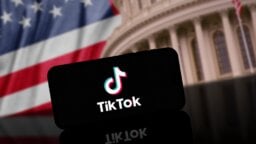Europe’s trade association for indie labels, IMPALA, has sided with Universal Music Group in its ongoing dispute with TikTok over fees for licensing music on the social media platform.
At the same time, IMPALA has also called on streaming services that recently made changes to their royalty payouts to address what it calls the “negative consequences” of those changes – namely, Spotify and Deezer’s moves towards an “artist-centric” payout model, and Apple’s changes to payouts that reward music available in spatial audio.
“There is an urgent need to secure fair revenues” from services such as TikTok, said Mark Kitcatt, chair of IMPALA’s streaming group and CEO of Everlasting Records and Popstock Distribuciones.
“In line with this, IMPALA supports UMG‘s stance on TikTok in relation to valuing music properly. The independent community has adopted a similar approach at various points over the years with other services, from MTV to Apple to YouTube.
“We also reject arguments equating the use of music on TikTok to promotion. There is a huge value gap that must be addressed but, beyond that, an exciting opportunity to explore new ways of generating and sharing revenues.”
In a statement issued Wednesday (April 4), IMPALA commented there is a “need for services like TikTok to collaborate with the independent music community to achieve fair licensing terms.”
TikTok responded via a spokesperson: “We value the relationships and the licensing agreements we have with the independent music community across Europe. TikTok has always been a licensed service and we’re proud of the successes that independent artists and businesses have found through our platform.
“Since the start of the year we’ve seen significant global hits from artists from a range of genres and countries, from established stars to those just starting out, and this success continues to grow.”
The dispute between UMG and TikTok exploded into public view at the end of January, when it emerged that UMG’s recorded music catalog would disappear from the social media platform by the end of the month, with the two sides unable to come to an agreement.
A month later, UMG’s publishing catalog began disappearing from TikTok as well.
The rhetoric between the two companies has been heated at times, with UMG saying that “agreements with TikTok have expired because of TikTok’s unwillingness to appropriately compensate artists and songwriters, protect human artists from the harmful effects of AI, and address online safety issues for TikTok’s users.”
For its part, TikTok alleged that “Universal Music Group has put their own greed above the interests of their artists and songwriters… Despite Universal’s false narrative and rhetoric, the fact is they have chosen to walk away from the powerful support of a platform with well over a billion users that serves as a free promotional and discovery vehicle for their talent.”
In its statement Wednesday, IMPALA rejected the notion that TikTok should be viewed as a promotional platform for music.
“It’s a use of music that needs to be remunerated like any other. The question of promotion isn’t relevant,” said Dan Waite, chair of IMPALA’s digital committee and CEO of Better Noise Music.
“We wish to see independent labels, rightsholders and artists receive fair pay for usage, and to have terms just as favorable as the largest majors renew their licenses on. Working together to better remunerate labels and artists across the whole industry is key. We urge TikTok and other services to respect this principle across the board.”
IMPALA’s support of UMG makes it the latest in a growing line of indie labels and trade associations to back UMG in its standoff with TikTok.
In a February guest column for MBW, Dr. Richard James Burgess, President and CEO of the American Association of Independent Music (A2IM), explained the thinking behind his group’s backing of UMG.
“Music has been foundational in building and popularizing platforms like TikTok (formerly known as Musical.ly), contributing significantly to their growth and user engagement,” Burgess wrote.
“Yet, this investment by the music industry has not been rewarded with equitable financial returns. In an industry that systemically underpays artists and labels, TikTok’s payment methodology is uniquely disadvantageous.”
He added: “The folly here for the music industry lies in sacrificing essential revenue from recorded music for the sake of promotion, exposure, or discoverability.”
“It’s a use of music that needs to be remunerated like any other. The question of promotion isn’t relevant.”
Dan Waite, IMPALA, Better Noise Music
Yet not everyone in the music industry feels they have been given a raw deal by TikTok; both Warner Music Group (WMG) CEO Robert Kyncl and Believe CEO Denis Ladegaillerie have suggested they are satisfied with their licensing deals with TikTok.
However, it’s not known how those deals compare to what TikTok has been offering to UMG.
‘Negative consequences’ of new royalty models
IMPALA’s latest statement also called on subscription music streaming services – specifically, Spotify, Deezer, and Apple Music – to address what the trade group calls the “negative consequences” of recent changes to their royalty payout models.
Spotify and Deezer recently changed their payment models towards what UMG Chairman and CEO Sir Lucian Grainge has dubbed the “artist-centric” royalty payment model.
Under Deezer’s changes, so far rolled out in France, “professional artists” – those who have a minimum of 1,000 streams per month and a minimum of 500 unique listeners – receive a so-called “double boost” to royalty payments, which gives those tracks double weighting when calculating royalties. A “double boost” is also applied to tracks from artists who have been actively searched for by Deezer users.
“We seek urgent solutions to address manipulation and revenue dilution [but] we also need to make sure the proposals are fair to all, and we hope Merlin‘s recent agreement with Deezer will contribute to this objective.”
Dario Drastata, IMPALA, RUNDA
So far, UMG, WMG and Merlin are among those who have signed on to Deezer’s artist-centric model.
Soon thereafter, MBW broke the news that Spotify is also moving towards something of an artist-centric model. Under its new payment model, now in effect, a track needs to have been listened to at least 1,000 times in the prior 12 months to be counted towards an artist’s streams, and a track also needs to have a certain minimum number of unique listeners.
While the changes are meant to address issues such as streaming fraud and low-quality tracks (both Spotify and Deezer’s changes came with ramped-up efforts to remove or penalize low-quality tracks), some in the industry have criticized the new payout model for potentially demonetizing music from new or emerging artists.
“We strongly oppose an unfair ‘reverse Robin Hood’ system that is centered around taking compensation from rising artists to allocate it to top and established artists,” Believe said last year.
“Further, it is our belief, based on data, that such a system would reduce diversity and discourage creativity.”
“IMPALA supports UMG’s stance on TikTok in relation to valuing music properly… We also reject arguments equating the use of music on TikTok to promotion.”
Mark Kitcatt, IMPALA, Everlasting Records, Popstock Distribuciones
IMPALA also named Apple in its statement, likely a reference to Apple’s recently introduced plan to give added weight to tracks available in spatial audio when paying out royalties.
“It’s literally going to take the money out of independent labels and their artists, to benefit the biggest companies in the marketplace,” an unnamed senior exec at an indie record company told the Financial Times earlier this year.
The indie music sector has “found it hard to justify the expense of creating spatial masters,” the exec added.
Now IMPALA has also voiced concerns about these new payment models, saying that “adjustments can be made” to these models “to avoid harm.”
“We seek urgent solutions to address manipulation and revenue dilution [but] we also need to make sure the proposals are fair to all, and we hope Merlin’s recent agreement with Deezer will contribute to this objective,” said Dario Drastata, Chair of IMPALA and Head of RUNDA, an indie discographers’ association in the Balkans.
“We believe for example that there are simple solutions for problems with thresholds that can be plugged in and will continue our constructive discussions with services to explore options. Finding the answers will ensure services are able to further develop opportunities in key markets and genres as well as across multiple languages.”
Established in 2000, Impala represents around 6,000 independent music companies operating out of European countries.
The association has issued a 10-point plan “to make the most of streaming,” which includes growing the overall revenue stream and ending dilution (for instance through low-quality noise tracks); rejecting “pay for play” schemes and “other initiatives recreating elements of payola”; and boosting local repertoire and languages.Music Business Worldwide





